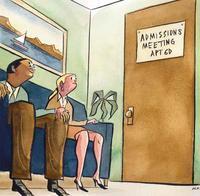HABITAT
Admissions Interview Rules 2011
June 8, 2011 — Everyone loves a good horror story, and here's one from the Co-op Hall of Fame. In 1995, a co-op board on the East Side of Manhattan turned down a financially qualified sublet candidate after two interviews. The African-American applicant sued the co-op and each member of the board for racial discrimination. And won. Big time. The board president at the time was found to be personally liable — along with the co-op and another director — for the $230,000 compensatory award and for $125,000 of the $410,000 in punitive damages.
It was all the proof any co-op board would ever need that interviewing potential shareholders and subletters can be a minefield — one you can avoid yourself just by better communication and knowing about a few simple laws.
The first thing co-op boards need to know: You must comply with not one, not two, but three sets of rules designed to shield "protected classes" from discrimination:
- The New York State Human Rights Law prohibits discrimination because of race, age, creed, national origin, or sex.
- The New York City Human Rights Law prohibits discrimination because of race, creed, color, national origin, gender, age, disability, sexual orientation, marital status, citizenship, presence of children, type of job, and as "alienage," i.e., "immigration status."
- The Federal Fair Housing Act prohibits discrimination because of race, color, religion, national origin, handicap, or family status.
So what with all that, just exactly what can you can in an application and an admissions interview?
'So, You Collect Stamps? Listen to Heavy Metal?'
"Boards can ask about finances, employment history, references, membership in clubs, charitable donations, hobbies [and] whether the applicant has ever been evicted or convicted of a crime," says Theresa Racht, a partner in the law firm Racht & Taffae.
A common financial benchmark is that the applicant's maintenance and debt service should total no more than one-third of his or her income. But many boards also consider other factors in assessing an applicant's financial worthiness, including assets, debt load, credit score, bankruptcy and litigation history, and child support or alimony payments.
"The real question is, 'Is this person financially responsible?' – however you define the term," says James Samson, a partner in the law firm of Samson Fink & Dubow. "It's subjective. Instead of relying on some rigid formula, look at the overall picture. Anyone can get fired and lose their income. Ask yourself: If they get to the point where they can't pay their maintenance, will they act responsibly?"
If you believe the answer is no, you have the right to reject the application. Of course, that doesn't mean you won't get hit with a discrimination claim.
Courting Danger
Mark Hankin, a partner in the law firm Hankin & Mazel, says he is called on to defend boards against discrimination claims a couple of times a year. When a rebuffed applicant files a discrimination complaint, he says, the lawyer's prime objective is to avoid going to a hearing, which can lead to a conviction, which will land the co-op on the "hot list" of properties that have a history of discrimination.
This, Hankin says, is one of those areas where prevention is the best medicine. He tries to meet with boards before they conduct an interview to coach them on what they shouldn't ask — and what they can't ask.
"I make it clear that there are certain matters that keep coming up," Hankin says. "When you review an application, you should always have an income guideline in writing — you spell out that a person has to make a certain amount of money to get into this co-op. The board has that absolute right. It's been legally tested. And I also say to be very careful during the interview. You should not ask about the familial relationship between two women, for example."
Leaving Normal
The greatest danger of the process? The tendency to treat the interview as a normal "let's get acquainted" conversation, rather than as a proceeding fraught with legal peril.




